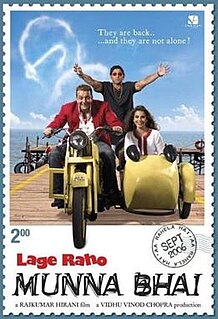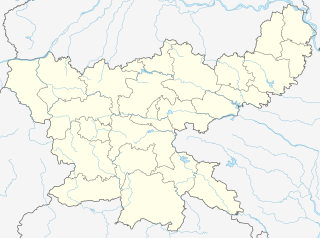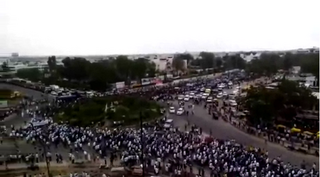
The massacre at the Qissa Khwani Bazaar in Peshawar, British India on 23 April 1930 was one of the defining moments of the independence movement in British India. It was the first major confrontation between British troops and demonstrators in the city, belonging to Abdul Ghaffar Khan's non-violent Khudai Khidmatgar movement against the British Indian government. Estimates at the time put the death toll from the shooting at between the official count at 20, and the figure of 400 dead put forth by Pakistani and Indian sources. The gunning down of unarmed people triggered protests across British India and catapulted the newly formed Khudai Khidmatgar movement into prominence.

Border is an 1997 Indian Hindi-language war film directed, produced and written by J. P. Dutta. Set during the Indo-Pakistani War of 1971, it is an adaptation of real life events that happened during the Battle of Longewala in 1971. The film stars an ensemble cast of Sunny Deol, Sunil Shetty, Akshaye Khanna, Jackie Shroff, Sudesh Berry, Puneet Issar and Kulbhushan Kharbanda. Tabu, Raakhee, Pooja Bhatt and Sharbani Mukherjee feature in supporting roles.
The Anti-Hindi agitations of Tamil Nadu were a series of agitations that happened in the Indian state of Tamil Nadu during both pre- and post-Independence periods. The agitations involved several mass protests, riots, student and political movements in Tamil Nadu concerning the official status of Hindi in the state.

Lage Raho Munna Bhai is a 2006 Indian Hindi-language comedy-drama film directed by Rajkumar Hirani and produced by Vidhu Vinod Chopra. It is the follow-up to the 2003 film Munna Bhai M.B.B.S. with Sanjay Dutt reprising his role as Munna Bhai, a Mumbai underworld don. In Lage Raho Munna Bhai, the eponymous lead character starts to see the spirit of Mahatma Gandhi. Through his interactions with Gandhi, he begins to practice what he refers to as Gandhigiri to help ordinary people solve their problems.

Gomoh is a census town in Topchanchi CD Block Dhanbad Sadar subdivision of Dhanbad district in the Indian state of Jharkhand. It has a major railway junction situated on the Grand Chord Line under Dhanbad division of the East Central Railway. Gomoh is the meeting point for trains coming from Howrah, Ranchi/Bokaro and Puri/Bhubaneswar.

Amrik Singh was the President of the All India Sikh Students Federation and was killed in the army operation in Golden Temple, Amritsar, on June 6, 1984.
The Gurjar agitation in Rajasthan were a series of protests in Rajasthan state, India, during 2008, and in later years. Violence erupted in the state of Rajasthan on 23 May 2008 when police fired on protesters belonging to the Gurjar caste who were demanding a Special status under India's reservation system. In retaliation, the protesters lynched a policeman in the Bharatpur district of Rajasthan. In response, police shot at protesters as they tried to damage railway lines and government property. At least 15 were killed on the spot.
On 26 May 2008, the government of India and the state Government of Jammu and Kashmir reached an agreement to transfer 99 acres (0.40 km2) of forest land to the Shri Amarnathji Shrine Board (SASB) in the main Kashmir valley to set up temporary shelters and facilities for Hindu pilgrims. This caused a controversy, with demonstrations from the Kashmir valley against the land transfer and protests from the Jammu region supporting it. The largest demonstration saw more than 500,000 protesters at a single rally, among the largest in Kashmir's history.

Choor Singh Sidhu, known professionally as Choor Singh, was a judge of the Supreme Court of Singapore and, particularly after his retirement from the bench, a philanthropist and writer of books about Sikhism. Born to a family of modest means in Punjab, India, he came to Singapore at four years of age. He completed his secondary education in the top class at Raffles Institution in 1929, then worked as a clerk in a law firm before becoming a civil servant in the Official Assignee's office.
The Anti-Hindi imposition agitation of 1937–40 is a series of protests that happened in Madras Presidency of the British Raj during 1937-40. It was launched in 1937 in opposition to the introduction of compulsory teaching of Hindi in the schools of the presidency by the Indian National Congress government led by C. Rajagopalachari (Rajaji). This move was immediately opposed by E. V. Ramasamy (Periyar) and the opposition Justice Party. The agitation, which lasted three years, was multifaceted and involved fasts, conferences, marches, picketing and protests. The government responded with a crackdown resulting in the death of two protesters and the arrest of 1,198 persons including women and children. The mandatory Hindi education was later withdrawn by the British Governor of Madras Lord Erskine in February 1940 after the resignation of the Congress government in 1939.

1969 Telangana Agitation was a political movement for the statehood for Telangana region. The first person to raise the issue of Telangana happened in 1968 during October or November timeframe. A hunger strike was being carried on by a person named Ravindranath on 1969/January/08 in Khammam near the Railway Station. He was on an indefinite fast and his prime demand was to implement Telangana safeguards. One other demand was his insistence on implemention of Gentleman's agreement. It is a major event in Telangana movement. In the indiscriminate police firing, 369 Telangana students were killed.

The Pre-2004 Telangana protests refers to the movements and agitations related to the Telangana movement that took place before the year 2004. Andhra state and Telangana was merged to form Andhra Pradesh state on 1 November 1956 after providing safeguards to Telangana in the form of Gentlemen's agreement. Soon after the formation of Andhra Pradesh, people of Telangana expressed dissatisfaction over how the agreements and guarantees were implemented. Protests initially led by students latet under the leadership of newly formed political party Telangana Praja Samithi, led by M. Chenna Reddy and Konda Lakshman Bapuji, a minister who resigned from the cabinet led by then Chief Minister Kasu Brahmananda Reddy, demanding the formation of a separate state of Telangana. More than three hundred people died in police firing. Under the Mulki rules in force at the time, anyone who had lived in Hyderabad for 15 years was considered a local, and was thus eligible for certain government posts. When the Supreme Court upheld the Mulki rules at the end of 1972, the Jai Andhra movement, with the aim of re-forming a separate state of Andhra, was started in Coastal Andhra and Rayalaseema regions.

The Battle of Tel Hai was fought on 1 March 1920 between Arab irregulars and a Jewish defensive paramilitary force protecting the village of Tel Hai in Northern Galilee. In the course of the event, a Shiite Arab militia, accompanied by Bedouin from a nearby village, attacked the Jewish agricultural locality of Tel Hai. In the aftermath of the battle eight Jews and five Arabs were killed. Joseph Trumpeldor, the commander of Jewish defenders of Tel Hai, was shot in the hand and stomach, and died while being evacuated to Kfar Giladi that evening. Tel Hai was eventually abandoned by the Jews and burned by the Arab militia.

The Bhagalpur riots of 1989 refers to the violence between the Hindus and the Muslims in the Bhagalpur district of Bihar, India. The riots started on 24 October 1989, and the violent incidents continued for 2 months, affecting the Bhagalpur city and 250 villages around it. Over 1,000 people were killed, and another 50,000 were displaced as a result of the violence. It was the worst instance of Hindu-Muslim violence in independent India at the time.

Satyagraha is a 2013 Indian Hindi-language political drama film directed by Prakash Jha starring Amitabh Bachchan, Ajay Devgn, Kareena Kapoor, Amrita Rao, Arjun Rampal, Manoj Bajpai, Mitalee Jagtap Varadkar, Jagat Singh and Vipin Sharma in the lead roles. The first look of the film was released on 10 September 2012. Satyagraha was released on 30 August 2013, although it released in the UAE one day before on 29 August. The teaser was released online on 30 May 2013 and theatrically attached with Yeh Jawaani Hai Deewani.

The 1985 Gujarat riots began in February 1985 and lasted till August, in the Indian state of Gujarat. Most of the rioting occurred in the city of Ahmedabad; some other cities, including the state capital of Gandhinagar, were also affected. Between 220 and 275 people were killed in the violence, while several thousands of others were injured, and tens of thousands were displaced. The riots also caused widespread property damage.

Starting in July 2015, the people of India's Patidar community, seeking Other Backward Class (OBC) status, held public demonstrations across the Indian state of Gujarat.
Rajeev Kumar is a former Director General of Police of the state of Jharkhand. He held highly responsible positions during his career. He is a 1981 batch IPS officer. He was appointed as the DGP Jharkhand in the year 2013 and served for two years thereafter. In the year 1997, he was awarded the President's Police Medal for Meritorious services and in the year 2014, he was also awarded the President's Police Medal for Distinguished services.

CISF Unit Delhi Metro Rail Corporation is a Central Industrial Security Force (CISF) unit responsible for providing security cover to Delhi Metro, Delhi, India. The Unit is headed by a Deputy Inspector General rank officer; currently by Jitender Rana, an IPS officer from Bihar cadre. The Headquarters of the Unit is situated at Shastri Park near Delhi IT Park. It is the single largest unit of CISF in the country with sanctioned strength of 12,528 personnel. The Unit operates two control rooms for better monitoring and coordination and has different specialised wings: Quick Reaction Team, Dog Squad and Bomb Detection Squad.
The Central Industrial Security Force Act, 1968, is an act of the Indian Parliament through which the Central Industrial Security Force (CISF) was raised on 10 March 1969. The CISF is a Central Armed Police Force which specialises in providing security and protection to industrial undertakings and other critical installations including nuclear plants, space centres and Delhi Metro. It is also the airport police of India.